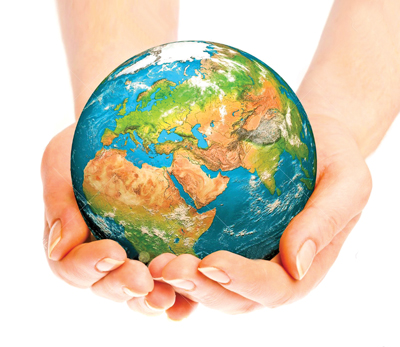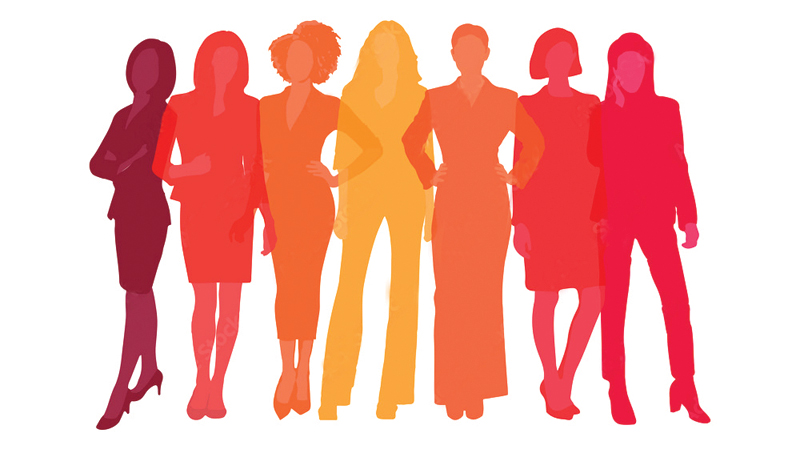International Women’s Day falls on March 8 – Celebrating strength, inspiring change – By Samangie Wettimuny
From the bustling streets of cities to the quiet corners of rural towns, women everywhere share their struggles. While some may argue that men face challenges too, the truth is that being born as a woman simply exposes one to a host of additional challenges and vulnerabilities.
Despite many obstacles, women across the globe have been stepping up in so many areas over the years. They’re making waves in politics, business, economics, and administrative fields. In the non-ending story of humanity’s journey, women indeed stand out as resilient heroes, crafting tales of strength and victory through the passage of time.
Every day is a woman’s day, that’s for sure. But certainly, there’s something special about March 8. Since its inception over a century ago, International Women’s Day has evolved into a global celebration of women’s achievements, resilience, and ongoing struggle for gender equality. It is a day to celebrate the unwavering spirit of women across boundaries, whose boundless strength and resilience light up the path toward a brighter, fairer tomorrow.
First woman PM
Despite the prolonged notion that women are incapable of effectively utilising their intelligence, they have consistently proven otherwise when given the chance. A notable example is from Sri Lanka itself! Decades ago, the world witnessed the remarkable leadership of Sirima Bandaranaike, the first female Prime Minister. Amidst adversity, as a grieving widow and mother of three, she faced disparaging remarks from opposition forces. Yet, she defied these odds, demonstrating unequivocally the strength and leadership acumen inherent in women. Sirima Bandaranaike’s legacy serves as a testament to the fact that gender does not impede excellence.
Effective administrative tips
A female local government officer, who preferred to remain anonymous, shared with the writer that despite not conducting a formal survey, her extensive 25-year experience suggests that the notion of female staff prioritising family and childcare over office duties is untrue. She emphasised the dedication and talent of many women under her supervision, noting their proactive efforts to expand their knowledge through reading and professional development courses. She also highlighted their invaluable support during the Covid-19 pandemic, surpassing the assistance provided by some male colleagues in higher positions.
While her account may not reflect the nationwide situation, it underscores the remarkable dedication and commitment demonstrated by female officers, despite numerous familial and personal obligations.
Sensitivity, not a weakness
 By nature, women may exhibit less outward toughness than men, yet their sensitivity and capacity to empathise are not weaknesses but rather blessings. These qualities make women more compassionate, without diminishing their rationality. Their ability to attentively listen to the grievances of others renders them more sympathetic leaders. Ultimately, effective leadership hinges not solely on strength but on qualities of empathy and understanding, which women often embody to a greater degree. Thus, a truly effective leader must first and foremost be a compassionate and empathetic human being.
By nature, women may exhibit less outward toughness than men, yet their sensitivity and capacity to empathise are not weaknesses but rather blessings. These qualities make women more compassionate, without diminishing their rationality. Their ability to attentively listen to the grievances of others renders them more sympathetic leaders. Ultimately, effective leadership hinges not solely on strength but on qualities of empathy and understanding, which women often embody to a greater degree. Thus, a truly effective leader must first and foremost be a compassionate and empathetic human being.
Many countries that appoint women to diplomatic missions find success, owing to the patience, courage, and diplomacy these women possess. Their ability to navigate complex negotiations with a blend of strength and grace often leads to favorable outcomes.
Global Gender Gap Report 2023
The 2023 edition of Global Gender Gap (GGGR) highlights a sobering reality; closing the gender gap will take over a century. Although the Global Parity Score has recovered to Pre-Covid-19 levels, the rate of change has remarkably slowed down. While strides have been made in educational attainment and health, progress in women’s economic participation and political empowerment remain significant challenges, with progress lagging behind.
According to GGGR 2023, Southern Asia has achieved 63.4 percent gender parity, the second-lowest score of the eight regions. Bangladesh, Bhutan, and Sri Lanka are the best-performing countries in the region, while Pakistan, Iran, and Afghanistan are at the bottom of both the regional and global ranking tables.
While Sri Lanka’s regional position may be deemed satisfactory, it’s important not to dismiss the concerning reality that the South Asian region ranks second-lowest among eight regions. This underscores the collective need for intensified efforts toward achieving gender parity within our region
Women’s participation in Labour Force
While Sri Lanka boasts robust labor laws and strong policy initiatives aimed at reducing barriers to women’s workforce participation, alongside a vibrant business sector promoting women’s empowerment through innovative programs, it remains disheartening to observe the surprisingly low level of women’s engagement in the workforce.
There exists a significant disparity between the number of female students attaining higher education and their representation in the Labour Market. Despite Sri Lankan girls achieving higher educational attainment on average compared to boys, with 32 percent of women participating in the labor force compared to 71 percent of men in the 2nd quarter of 2022, there persists a gendered division of labour within households.
Studies indicate that women with secondary education are more likely to be absent from the labour force, whereas tertiary education significantly increases the likelihood of female Labour Force participation.
Hence, enabling access to tertiary education plays a critical role in breaking this cycle.
Additionally, societal attitudes and norms regarding women’s roles outside the home influence their participation in the labor force, particularly within certain communities and ethnic groups.
Discriminatory attitudes
Norms and biases such as discriminatory attitudes affecting hiring, promotion, and retention practices in the workplace also hurt women’s employment prospects, particularly in male-dominated environments. While sectors like teaching and nursing continue to attract a large proportion of female employees, professions such as law and medicine are witnessing a rise in female graduates.
For lower-educated women, stereotyping of job roles and poor working conditions pose significant barriers to engagement in sectors like garment work, despite job availability.
The low female labour force participation rate in Sri Lanka has been attributed to several socioeconomic factors. Among those the key factor is the significant burden of care responsibilities that women bear, including household tasks and caregiving duties. Women spend a lot more time doing unpaid care work than men, usually because society expects them to do so because of their gender. The truth is women are predominantly tasked with child-rearing, household chores, and elder care, while men are expected to be the primary breadwinners.
Legal barriers also limit women’s job options, like restrictions on night duty and not acknowledging part-time work. These legal provisions inadvertently limit women’s earning potential and contribute to their reluctance to enter the labor market.
Inadequate social infrastructure also further discourages women from participating in the workforce. For example in Sri Lanka there is limited access to quality child care centres and comprehensive parental leave policies such as Paternity leave.
Traditional views
Traditional views on daycare centres may also serve as an obstacle at times. Many young mothers the Sunday Observer interviewed mentioned that their in-laws or, in some cases, their parents discouraged them from leaving their child at a daycare centre too soon. They believe it’s not the best way to care for a child, especially in a traditional Asian country like Sri Lanka.
Skill mismatch in the labour market aggravates the issue, as the education system fails to adequately prepare graduates for available job opportunities. This mismatch disproportionately affects women, particularly arts degree holders, who struggle to find employment. However, currently, it is heartening to see more girls opting for STEM ( Science, Technology, Engineering and mathematics) education.
As recognised by the United Nations, the historical underrepresentation of women in STEM fields has gradually shifted, with a positive trend emerging as more female students choose to enter these domains.
Thus the skill mismatch in the Labour Market prevalent in many Asian Countries including Sri Lanka is likely to decrease in the coming years.
Impact of limiting beliefs
Despite advancements in women’s rights movements, it’s disheartening to observe that some educated families remain hesitant to allow their daughters to pursue certain careers. Several women shared with the writer that their parents or husbands insist they return home by 5 pm, leading them to settle for lower-paying jobs like teaching or clerical work. In a particularly distressing case, one woman, wishing to remain anonymous, recounted how she was forced to resign from her prestigious legal officer position to save her marriage. She now works as a babysitter.
It is essential to address these barriers to enhance female labour force participation rates in Sri Lanka.
UN Theme
The United Nations has declared ‘Invest in Women: Accelerate Progress’ as the theme for Women’s Day 2024.
It underscores the importance of directing resources towards empowering women and advancing gender equality, recognising that such investments are indispensable for driving meaningful progress and creating a more just and sustainable world.
Investing in women: A human rights issue, ending poverty, implementing gender-responsive financing, shifting to a green economy and care society and supporting feminist change-makers are the five key areas that need our joint action to ensure women are not left behind, says UN Women.
Investing in women: A human rights issue: Gender equality remains a paramount human rights challenge, requiring collective action to ensure that women are not left behind. Investing in women is not just a matter of equality; it is fundamental to building inclusive societies where progress benefits everyone.
Ending poverty: The compounding effects of the Covid-19 pandemic, geopolitical conflicts, climate disasters, and economic instability have exacerbated poverty, particularly impacting women and girls. Immediate action is imperative to prevent a projected increase in poverty levels, with estimates suggesting millions more women and girls could fall below the poverty line by 2030.
Implementing gender-responsive financing: Austerity measures, driven by conflicts and rising fuel and food prices, threaten to undermine public spending on essential services and social protection, disproportionately affecting women. Gender-responsive financing is crucial to counteract these trends and ensure that resources are directed toward supporting women’s empowerment and well-being.
Shifting to a green economy and care society: The current economic system exacerbates poverty, inequality, and environmental degradation, with women and marginalised groups bearing the brunt of these challenges. Advocates for alternative economic models, including a shift towards a green economy and care society, emphasize the importance of amplifying women’s voices in shaping policies and strategies for sustainable development.
Supporting feminist change-makers: Feminist organisations are at the forefront of efforts to address women’s poverty and inequality, yet they often face resource constraints and inadequate support. Strengthening support for feminist change-makers is essential to advancing gender equality and ensuring that women’s voices and priorities are central to decision-making processes.
Buddhism and women
In the teachings of the Buddha, it was proclaimed that women possess equal potential to attain enlightenment, known as Arahantship, through the cultivation of the mind. During a time when women faced severe discrimination in India, the Buddha advocated for their emancipation, offering them a path to spiritual liberation.
Though the Bhikkuni Order, comprising female monastics, may not exist in present-day Buddhist societies, it flourished during the Buddha’s era, with female Bhikkunis guiding many towards the path of enlightenment. Even during a discussion with King Pasenadi of Kosala, who expressed disappointment upon the birth of a daughter, the Buddha reassured him of the profound value and potential of women in the pursuit of spiritual awakening.
The Goal 5 of SDGs
The Goal 5 of the UN Sustainable Development Goals (SDGs) is dedicated to achieving gender equality and empowering all women and girls by 2030. This goal recognises the fundamental importance of gender equality as not only a human rights issue but also as a prerequisite for achieving sustainable development. By addressing the unique challenges faced by women and girls worldwide, such as discrimination, violence, and unequal access to education and healthcare, Goal 5 aims to create a more inclusive and equitable society for all.
Women ,victims of Climate Change
Women are disproportionately affected by climate change, facing heightened risks and vulnerabilities due to their roles as primary caregivers, food providers, and guardians of natural resources in many societies. According to the United Nations, women constitute the majority of the world’s poor and are more likely to experience the adverse impacts of climate-related disasters, including displacement, loss of livelihoods, and increased exposure to violence and exploitation. Furthermore, systemic inequalities and gender-based discrimination often limit women’s access to resources, decision-making processes, and adaptive capacities, exacerbating their vulnerability to climate change. Recognising the unique challenges faced by women in the context of climate change is essential for developing effective and equitable strategies to mitigate its impacts and build resilient communities. The United Nations has emphasised the importance of integrating gender considerations into climate policies and programs to ensure that women’s voices are heard, their rights are upheld, and their contributions to climate action are recognised and supported.
What is left to be done
Empowerment programs, such as vocational training and micro-finance initiatives, play a crucial role in advancing gender equality by providing women and girls with the skills and resources they need to thrive economically. Additionally, ensuring access to comprehensive healthcare services, including sexual and reproductive health services, is essential for promoting women’s rights and well-being. This includes guaranteeing reproductive rights, addressing barriers to healthcare access, and combatting stigma and discrimination. Creating and maintaining safe public spaces is also vital, as it allows women and girls to move freely without fear of harassment or violence. Improving lighting, infrastructure, and transportation systems can enhance safety for all community members. Media representation is another key aspect, as promoting positive and diverse portrayals of women challenges harmful stereotypes and fosters equality. Finally, community engagement through partnerships and grassroots initiatives is essential for supporting survivors of gender-based violence and providing resources for women and girls in need, while also encouraging solidarity and collective action to address systemic issues and drive lasting social change.
Happier tomorrow
Compared to the early 20th century when the women’s movement began, women have made significant strides, but there is still a long journey ahead. It’s undeniable that women continue to encounter challenges and require additional support across various realms—social, economic, and bureaucratic. However, as women, we must resist the mindset of perpetual victimhood, even though it may be valid at times. Taking full responsibility for our lives is needed. Women should cultivate a spirit of support and solidarity, championing one another’s success and safeguarding the well-being of fellow women.
Strength in women isn’t about adopting masculine traits. True strength lies in embracing sensitivity, emotionality, and rationality. The strongest women, in my opinion, demonstrate proficiency in both IQ and EQ. So, to all women out there, remember: your inherent strength lies in being true to yourself and extending a helping hand to others.






